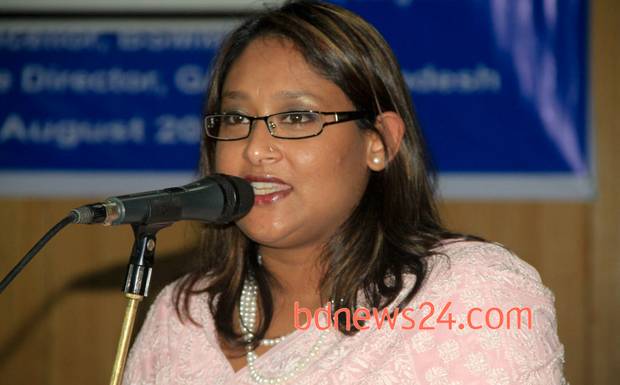Global autism advocate Saima Wazed Hossain has urged Asian nations to develop culturally sensitive tools to manage growing cases of neuro-development disorders.
Known by her nickname, Putul, in Bangladesh, Saima made the appeal since she found Asian countries were “too dependent on Western modules and therapies” that might not be consistent with Asian cultures.
Saima, daughter of Prime Minister Sheikh Hasina, spearheads autism campaigns in Bangladesh, and it was largely her endeavors that brought South Asian nations together under the South Asian Autism Network’s (SAAN).
The US-licensed school psychologist placed her idea at her meetings with the Malaysian ministers for women, family and community development, and health in Malaysia after attending a recent international seminar, according to a message received here.
She also exchanged views on the possible sharing of knowledge between Bangladesh and Malaysia in autism management and education.
Both the Malaysian Ministers readily offered to cooperate with Bangladesh in this regard.
Saima stressed ‘concerted efforts’ to develop diagnostic and management tools consistent with Asian culture.
Neuro-development disorder drew global attention in recent years following a study revealing millions of children worldwide suffering in silence in the absence of adequate understanding of the problem.
Autistic children are unable to pick up self-care tasks – dressing, self-feeding, using the toilet etc. – by watching and imitating. They avoid eye-to-eye contact, and have a single-track thought process.
The problem usually begins to show up in the first three years of life, affecting the normal development of social and communication skills.
No one can say why, but the trend is rising.
Bangladesh has no data on the number of children suffering from the disorder, but a latest US study finds one in every 68 children to be autistic – a rate 30 percent higher than what it was three years ago.
But those gifted children show particular talent if they get proper education as well as training exercise.
In Malaysia, where Saima joined international experts at a seminar titled ‘Autism is not a Tragedy, Ignorance Is’ on April 22-23 at Putrajaya, many autistic children have been able to enroll in American universities with “very high academic scores”.
The Malaysian Prime Minister’s Office is said to be generous in giving financial support to overcome this problem.
It is also Saima’s efforts that have brought the issue to the fore in Bangladesh.
She is the Chairperson of the Bangladesh’s National Advisory Committee on Autism and Neuro-developmental Disorders, and Global Autism Public Health Initiative– Bangladesh.
The United Nations and WHO South East Asia Region have adopted two separate resolutions on autism moved by Bangladesh.
WHO is expected to pass a resolution on ‘comprehensive and coordinated efforts’ for the management of autism spectrum disorders, also moved by Bangladesh in this year’s annual general assembly.
Yet, the early detection of developmental disorders like autism is still a challenge in resource-starved countries like Bangladesh.
She said even a few years back families with autistic children were “stigmatised”.
But she has always championed the rights of those special children and advocated home-grown solutions.
In a South Asia conference in New Delhi held in February last year, she delivered a persuasive plea for countries to understand the magnitude of neuro-development disorders and design ‘culturally sensitive and economically feasible’ evidence-based interventions.
The Malaysia seminar, aimed at raising awareness and inspiring societies to swing into action, brought many first ladies including Sri Lanka, Kyrgyz, Sudan, Singapore, Albania, and Morocco and international autism experts together.
Source: Bd news24

